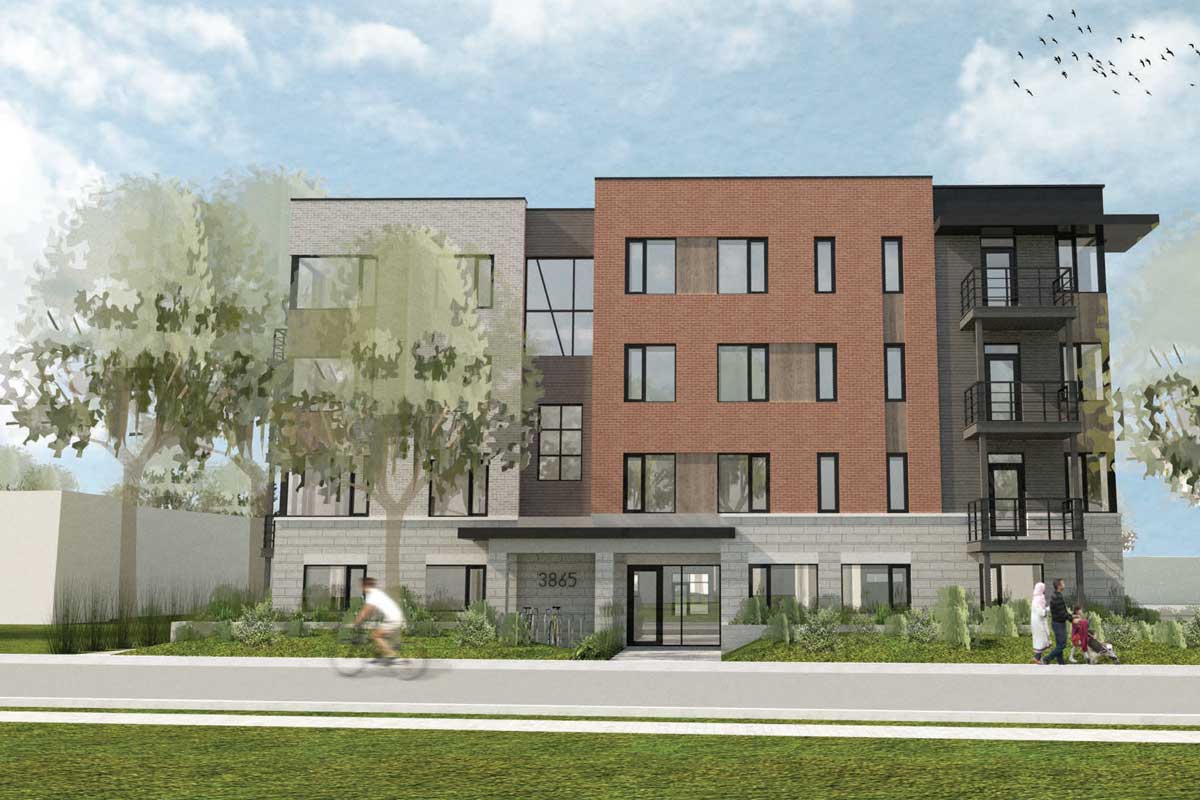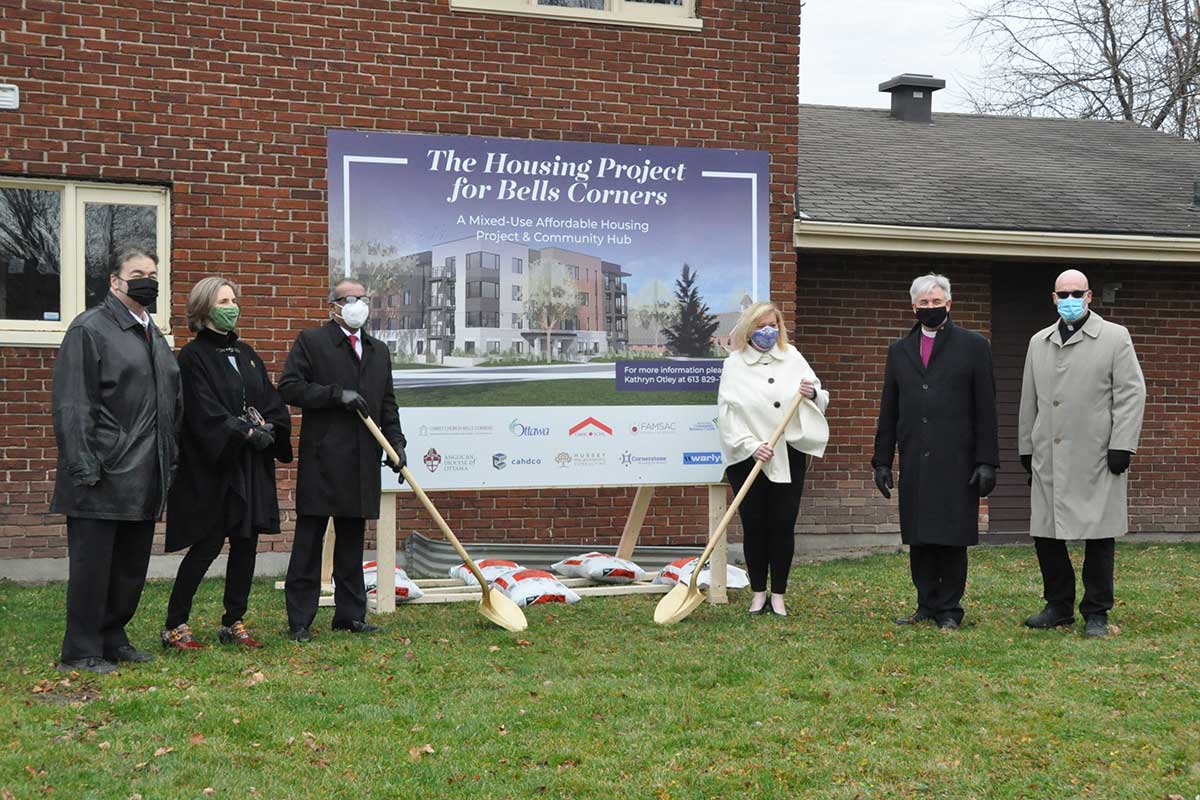The diocese’s Homelessness and Affordable Housing Working Group (HAHWG) is moving into a new phase that is expected to place greater emphasis on partnering with other denominations and stakeholders and expanded communications.
The group met in April to begin looking beyond 2021 and the campaign to create 125 housing units in celebration of the diocese’s 125th anniversary this year. Bishop Shane Parker, who has called on the diocese to “embrace the challenges that face us” will participate in a meeting with the group in June to discuss plans for the future.
The visioning exercise will consider ways to add value by offering unique and effective support to parishes. The eight-member group will be building on experience of the last six years with its original mandate clear in the rearview mirror. They will also look at how best to engage with potential partners and the community.
Report Card
Parishes in the diocese have been supporting affordable housing for many years. In 2014, Diocesan Synod formalized the cause by calling for “systematic consideration of homelessness and affordable housing in our stewardship and disposition of church property and real estate, engaging with the world through cooperation with ecumenical and interfaith partners and non-profit organizations in projects, advocacy and prayerful consideration of the needs of the homeless and inadequately housed.”
Among the specific responsibilities that the Community Ministries Committee proposed in 2015 for the working group are those to:
- develop a plan to engage all parts of the diocese in action, advocacy, learning and prayer.
- establish an inventory of projects related to homelessness and affordable housing in which diocesan groups were already engaged.
- consider ways in which the Community Ministries’ day programs could play a central role in a diocesan strategy.
The collective experience of the eight-member working group bodes well for implementing the co-operation and partnership anticipated in the Synod resolution on a person-to-person basis. The Chair is Sue Garvey, retired executive director of Cornerstone Housing for Women. Members are the Rev Canon PJ Hobbs, the diocesan director or mission; Moira Alie, project coordinator at Alliance to End Homelessness Ottawa; Jim Davison of the diocesan Real Estate Working Group: Archdeacon Kathryn Otley of Christ Church Bells Corners; Joyce Potter, retired vice president of Canada Mortgage and Housing Corporation and director at City of Ottawa Housing; Gay Richardson, a founding director of Multifaith Housing Initiative (MHI) and David Humphreys, a retired journalist and government relations consultant (writing this report).
Since 2015, the working group’s main focus has been support for projects initiated by parishes and the day programs while encouraging and supporting new initiatives throughout the diocese.
Affordable housing projects are underway or in the final planning process at Christ Church Bells Corners, Julian of Norwich in Nepean, St Thomas the Apostle (Ellwood House extension) in Alta Vista. When completed they will allow the diocese to achieve its goal of creating 125 units for the 125th anniversary.
In 2019, the group organized a forum attended by 71 delegates from parishes across the diocese. Its purpose was to help parishes participate regardless of circumstances. Workshops covered all aspects for parish participation: how to get started even if the parish has no money or land to offer, rural considerations and innovative partnerships.
More recently, St. John the Evangelist Smiths Falls, St James Perth and St. James Carleton Place have all begun to explore innovative projects in partnership with community stakeholders.
At least 14 parishes are members of Multifaith Housing Initiative, a coalition that builds affordable units in Ottawa. The parish of Good Shepherd Barrhaven has played an instrumental role in the development of The Haven, a 98-home project in Barrhaven that opened in 2017. Anglicans have been active in the development of the newly-completed MHI Veterans’ House on CFB Rockcliffe Airbase Lands. MHI is also a principal partner along with the Diocese in the Julian of Norwich project. Back in the mid-‘80s Anglicans were founding members of West Nepean Ecumenical Residential Projects, which built Harmer House, providing 60 apartments for seniors’ independent living. Several parishes participate in MHI’s annual fundraising walk, notably teams from St. John’s Elgin St. and St Bartholomew’s New Edinburgh.
Many parishes have demonstrated support for the homeless by providing meals, safe daytime space and counsel. Others have provided affordable housing on an individual basis. The Parish of the Valley in Pembroke supports the community food bank and the Renfrew County Poverty Action Network. St. Paul’s Almonte rented a house at highly subsidized rent to a refugee family and is looking at more long-term reimagining of its entire property. St. John’s Richmond renovated its rectory, also to house a refugee family. Trinity Ottawa near Carleton University rented its rectory to up to six students. St Mary Magdalene Chelsea raises funds for the Chelsea Housing Corporation’s current project, 12 units of affordable housing for seniors as well as for the Quebec Association for Independent Living. St John’s South March leased land for the Blue Heron Cooperative that provides 81 units in Kanata North and is actively engaged with the cooperative.

Moving forward
The Homeless and Affordable Housing Working Group began planning for a workshop to address the myths about affordable housing captured in the acronym NIMBY, not in my back yard. Yes in My Back Yard (YIMBY) was being designed to help build community engagement for affordable housing. While the demands of the pandemic have intervened, YIMBY remains as a project in progress. Work is well advanced, in line with the group’s initial mandate, on an inventory of housing initiatives broken down by categories.
As well as the parish-initiated projects that are under way, some parishes have leased land for developments that revert back to them at the end of a lease. In addition to the Blue Heron Co-op these include Beek Lindsay Seniors Residences in Cornwall, lease reverting back to Trinity Cornwall in 2024 and Serson Clarke Apartments, reverting back to St Luke’s Ottawa in 2031. One parish, St. John’s Elgin Street, sold land outright to a developer who built the 119-unit Somerset Gardens, some units classified as affordable.
The central role of day programs has never been in doubt. As homelessness has increased in the diocese, the Community Ministries’ programs have expanded services to meet ever-rising demand. In Ottawa, Centre 454, The Well and St Luke’s table pooled resources and partnered with the City of Ottawa during the pandemic. In Cornwall, Centre 105 substantially increased its supply of meals, added staff, and renovated washrooms for general use.
The Diocese’s commitment to housing is echoed nationally and even internationally. The Anglican Church of Canada committed to action, advocacy and prayer on the issue in the Joint Assembly of 2013. The Archbishop of Canterbury’s Commission on Housing, Church and Community has called for homelessness and affordable housing to be a major element of the church’s mission in the coming years.





Saint Mary’s Church, Westmeath — Deanery of the Northwest